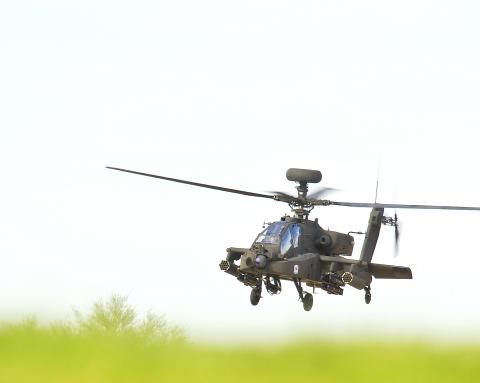Two US companies have won contracts to produce utility and attack helicopters for the military, in separate bids that will run through the end of 2014.
In a press release on Friday, Boeing Co said it had received a US$171.8 million firm-fixed-price contract to deliver AH-64D Apache Block III helicopters for the Taiwanese military.
Although the announcement did not specify the number of helicopters, it comes after Longbow Limited Liability Co, a joint -venture of Lockheed Martin Corp and Northrop Grumman Corp, won a contract in January for 15 Block III Longbow Fire Control Radar (FCR) systems for Taiwan, which at the time was the first international client for the advanced target acquisition system.

Photo: Boeing
Given this, analysts conclude that the Boeing contract involves 15 airframes, out of the 30 included in the US$6.4 billion arms package announced by the US in October 2008.
Taiwan has yet to place an order for the AGM-114L Hellfire missiles included in the package.
Unless it does so, the Apache’s FCR capabilities will be essentially useless, a defense source has told the Taipei Times.
Meanwhile, Sikorsky Aircraft Corp announced it had received a US$43.2 million firm-fixed-price contract for engineering services to convert four UH-60M Black Hawk helicopters “to the specific unique configuration for Taiwan.”
The US$48.6 million contract for the first four “green,” or standard, airframes was announced in June last year. Conversion work ensures the product meets the requirements and specific -configurations sought by the procuring country, and usually pertains to navigation and communications systems.
The total cost for the four Black Hawks — the first segment of the 60 included in the January 2010 US$6.4 arms package — will be US$91.8 million, or US$23 million per aircraft.
A defense industry source told the Taipei Times yesterday that Taiwan remained fully committed to procuring all 60 UH-60Ms and that things were proceeding smoothly. Delivery of the first four Black Hawks is expected to begin toward the end of 2014.

Alain Robert, known as the "French Spider-Man," praised Alex Honnold as exceptionally well-prepared after the US climber completed a free solo ascent of Taipei 101 yesterday. Robert said Honnold's ascent of the 508m-tall skyscraper in just more than one-and-a-half hours without using safety ropes or equipment was a remarkable achievement. "This is my life," he said in an interview conducted in French, adding that he liked the feeling of being "on the edge of danger." The 63-year-old Frenchman climbed Taipei 101 using ropes in December 2004, taking about four hours to reach the top. On a one-to-10 scale of difficulty, Robert said Taipei 101

Taiwanese and US defense groups are collaborating to introduce deployable, semi-autonomous manufacturing systems for drones and components in a boost to the nation’s supply chain resilience. Taiwan’s G-Tech Optroelectronics Corp subsidiary GTOC and the US’ Aerkomm Inc on Friday announced an agreement with fellow US-based Firestorm Lab to adopt the latter’s xCell, a technology featuring 3D printers fitted in 6.1m container units. The systems enable aerial platforms and parts to be produced in high volumes from dispersed nodes capable of rapid redeployment, to minimize the risk of enemy strikes and to meet field requirements, they said. Firestorm chief technology officer Ian Muceus said

MORE FALL: An investigation into one of Xi’s key cronies, part of a broader ‘anti-corruption’ drive, indicates that he might have a deep distrust in the military, an expert said China’s latest military purge underscores systemic risks in its shift from collective leadership to sole rule under Chinese President Xi Jinping (習近平), and could disrupt its chain of command and military capabilities, a national security official said yesterday. If decisionmaking within the Chinese Communist Party has become “irrational” under one-man rule, the Taiwan Strait and the regional situation must be approached with extreme caution, given unforeseen risks, they added. The anonymous official made the remarks as China’s Central Military Commission Vice Chairman Zhang Youxia (張又俠) and Joint Staff Department Chief of Staff Liu Zhenli (劉振立) were reportedly being investigated for suspected “serious

American climber Alex Honnold is to attempt a free climb of Taipei 101 today at 9am, with traffic closures around the skyscraper. To accommodate the climb attempt and filming, the Taipei Department of Transportation said traffic controls would be enforced around the Taipei 101 area. If weather conditions delay the climb, the restrictions would be pushed back to tomorrow. Traffic controls would be in place today from 7am to 11am around the Taipei 101 area, the department said. Songzhi Road would be fully closed in both directions between Songlian Road and Xinyi Road Sec 5, it said, adding that bidirectional traffic controls would